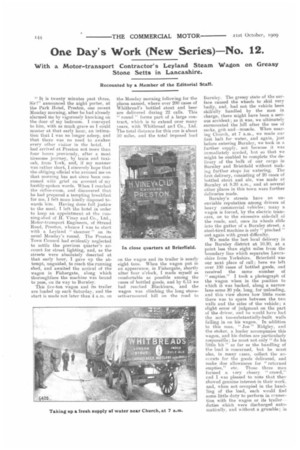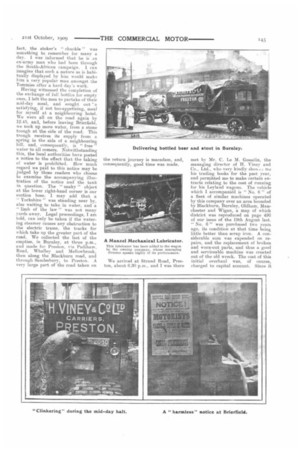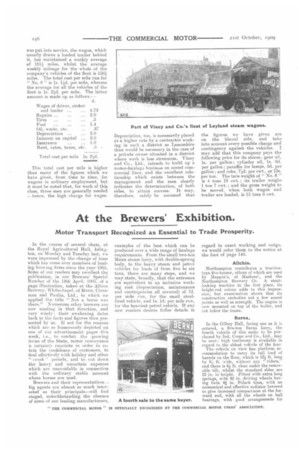One Day's Work (New Series)—No. 12.
Page 14

Page 15

Page 16

If you've noticed an error in this article please click here to report it so we can fix it.
With a Motor-transport Contractor's Leyland Steam Wagon on Greasy Stone Setts in Lancashire.
Recounted by a Member of the Editorial Staff.
" It is twenty minutes past three, Sir!" announced the night porter, at the Park Hotel, Preston, one recent Monday morning, after he had already alarmed me by vigorously knocking on the door of my bedroom. I conveyed to him, with as much grace as I could muster at that early hour, an intimation that I was no longer asleep, and that there was no need to awaken
every other visitor in the hotel. I had arrived at Preston not more than four hours previously, after a most tiresome journey, by train and taxicab, from York, and, if my manner was rather short, I sincerely hope that the obliging official who aroused me on that morning has not since been consumed with grief on account of my hastily-spoken words. When I readied the coffee-room, and discovered that he had prepared a tempting breakfast for me, 1 felt more kindly disposed towards him. Having done full justice to the meal. I left the hotel in order to keep an appointment, at the running-shed of H. Viney and Co., Ltd., Motor-transport Engineers, of Strand Road, Preston, whence I was to start with a Levland " steamer " on its usual Monday's round. The Preston Town Council had evidently neglected to settle the previous quarter's account for street lighting, and, as the streets were absolutely deserted at that early hour, I gave up the attempt, unguided, to reach the running shed, and awaited the arrival of the wagon in Fishergate, along which thoroughfare the machine was bound to pass, on its way to Burnley.
This five-ton wagon and ith trailer are loaded up each Saturday, and the start is made not later than 4 a.m. on the Monday morning following for the places named, where over 200 cases of Whitbread's bottled stout and beer are delivered during 22 calls. This " round " forms part of a large contract, which is to extend over many years, with Whitbread and Co., Ltd. The total distance for this run is about 50 miles, and the total imposed load on the wagon and its trailer is nearly eight tons. When the wagon put in an appearance, in Fishergate, shortly after four o'clock, I made myself as comfortable as possible among the cases of bottled goods, and by 6.15 we had reached Blackburn, and the wagon was climbing the long stonesett-armoured hill on the road to
Burnley. The greasy state of the surface caused the wheels to skid very badly, and, had not the vehicle been skilfully handled by the men in charge, there might have been a serious accident; as it was, we ultimately surmounted the hill after the use of sacks. grit and—nausele. When nearing Church, at 7 a.m., we made our first halt for water, and again, just before entering Burnley, we took in a further supply, not because it was immediately needed, but so that we might be enabled to complete the delivery of the bulk of our cargo in Burnley and Brierfield without making further stops for watering. The first delivery, consisting of 20 cases of bottled stout and ale, WEIS made at Burnley at 8.20 a.m., and at several other places in this town were further deliveries made.
Burnley's streets have an unenviable reputation among drivers of heavy commercial vehicles; many a wagon is forced, by the electric tramcars, on to the excessive side-fall of the roads, and, once its wheels slide into the gutter of a Burnley street, a steel-tired machine is only " pinched" out again with great difficulty. We made the last local delivery in the Burnley district at 10.30, at a point less than eight miles from the boundary line which separates Lancashire from Yorkshire. Brierfield was our next place of call ; here we left over 100 eases of bottled goods, and received the same number of " empties." I took a. photograph of the wagon when in the position to which it was backed, along a narrow lane some 30 yds. long, for unloading, and this view shows how little room there was to spare between the two walls and the sides of the vehicle; a slight error of judgment on the part of the driver, and he would have had the not too-substantially-built walls falling in on his wagon. In addition to this man, " Joe " Ridgley, and the stoker, a. loader accompanies this wagon, and his duties are particularly responsible; lie must not only "do his little bit " so far as the handling of the load is concerned, but he must also, in many cases, collect the aeccents for the goods delivered, and make due allowances for " returned empties," etc. These three men formed a. N cry cheery " crowd," and I was pleased to note that they showed genuine interest in their work, and, when not occupied in the handling of the load, each would find some little duty to perform in connection with the wagon or its trailer-duties which were discharged automatically, and without a grumble; in fact, the stoker's " chuckle" was something to remember for many a day. I was informed that he is an ex-army man who had been through the South-African campaign. I can imagine that such a nature as is habitually displayed by him would make him a very popular man amongst the Tommies after a hard da3's work. Having witnessed the completion of the exchange of full bottles for empty ones, I left the men to partake of their mid-day meal, and sought. out • a satisfying, if not too-appetising, meal for myself at a neighbouring hotel. We were all on the road again by 12.45, and, before leaving Brierfield, we took up more water, from a stone trough at the side of the road. This trough receives its supply from a spring in the side of a neighbouring bill, and, consequently, is " free " water to all comers. Notwithstanding this, the local authorities have posted a notice to the effect that the taking of water is prohibited. How much regard we paid to this notice may be judged by those readers who choose to examine the accompanying illustration of the notice and the tank in question. The " snaky" object at the lower right-hand corner is our suction hose. I may add that a
Yorkshire " was standing near by, also waiting to take in water, and a " limb of the law " was not many yards away. Legal proceedings, I am told, can only be taken if the watering steamer causes any obstruction to the electric trams, the tracks for which take up the greater part of the road. We collected the last of the empties, in Burnley, at three p.m., and made for Preston, via Padtham, Read, Whalley and Mellowbrook, then along the Blackburn road, and through Sandesbury, to Preston. A very large part of the road taken on the return journey is macadam, and, consequently, good time was made.
We arrived at Strand Road, Preston, about 6.30 p.m., and I was there
met by Mr. C. be M. Gosselin, the managing director of H. Viney and Co., Ltd., who very kindly sliou..-.L me his trading books for the past year, and permitted MB to make certain extracts relating to the cost of running for his Leyland wagons. The vehicle which I accompanied is " No. 6 " of a fleet of similar machines operated by this company over an area bounded by Blackburn, Burnley, Oldham, Manchester and Wigan, a map of which district was reproduced on page 490 of our issue of the 19th August last. " No. 6 " was purchased two years ago, its condition at that time being little better than scrap iron. A considerable sum was expended on repairs, and the replacement of broken and worn-out parts, and thus a good and serviceable machine was created out of the old wreck. The cost of this initial overhaul was, of course, charged to capital account. Since it was put into service, the wagon, which usually draws a loaded trailer behind it, has maintained a weekly average of 161:1 miles, whilst the average weekly mileage for the whole of the company's vehicles of the fleet is 15611
'rhe total cost per mile run for " No. 6 " is is. 10. per mile, whereas the average for all the vehicles of the fleet is is. 24d. per mile. The latter amount is made up as follows :— This total cast per mile is higher than many of the figures which we have given, from time to time, for wagons in ordinary employment, but it must be noted that, for work of this class, three men are generally needed -hence, the high charge for wages.
Depreciation, too, is necessarily placed at a higher rate by a contractor working in such a district OS Lancashire than would be necessary in the ease of a private owner situated in a district where work is less strenuous. Viney and Co., Ltd., intends to build up a motor-haulage business on sound cornwercial lines, and the excellent relationship which exists between the management and the men clearly indicates the determination, of both sides, to attain success. It may, therefore, safely be assumed that
the figures we have given are on the liberal side, and take into account every possible charge and contingency against the vehicles. I may add that this company pays the following price for its stores: gear oil, is. per gallon ; cylinder oil, le. 6d_ per gallon ; paraffin for lamps, 5d. per gallon ; and coke, 70. per cwt., or 15s. per ton. The tare weight of " No. 6 " is 4 tons 19 cwt. ; its trailer weighs 1 ton 7 cwt.; and the gross weight to be moved, when both wagon and trailer are loaded, is 15 tons 6 cwt.






















